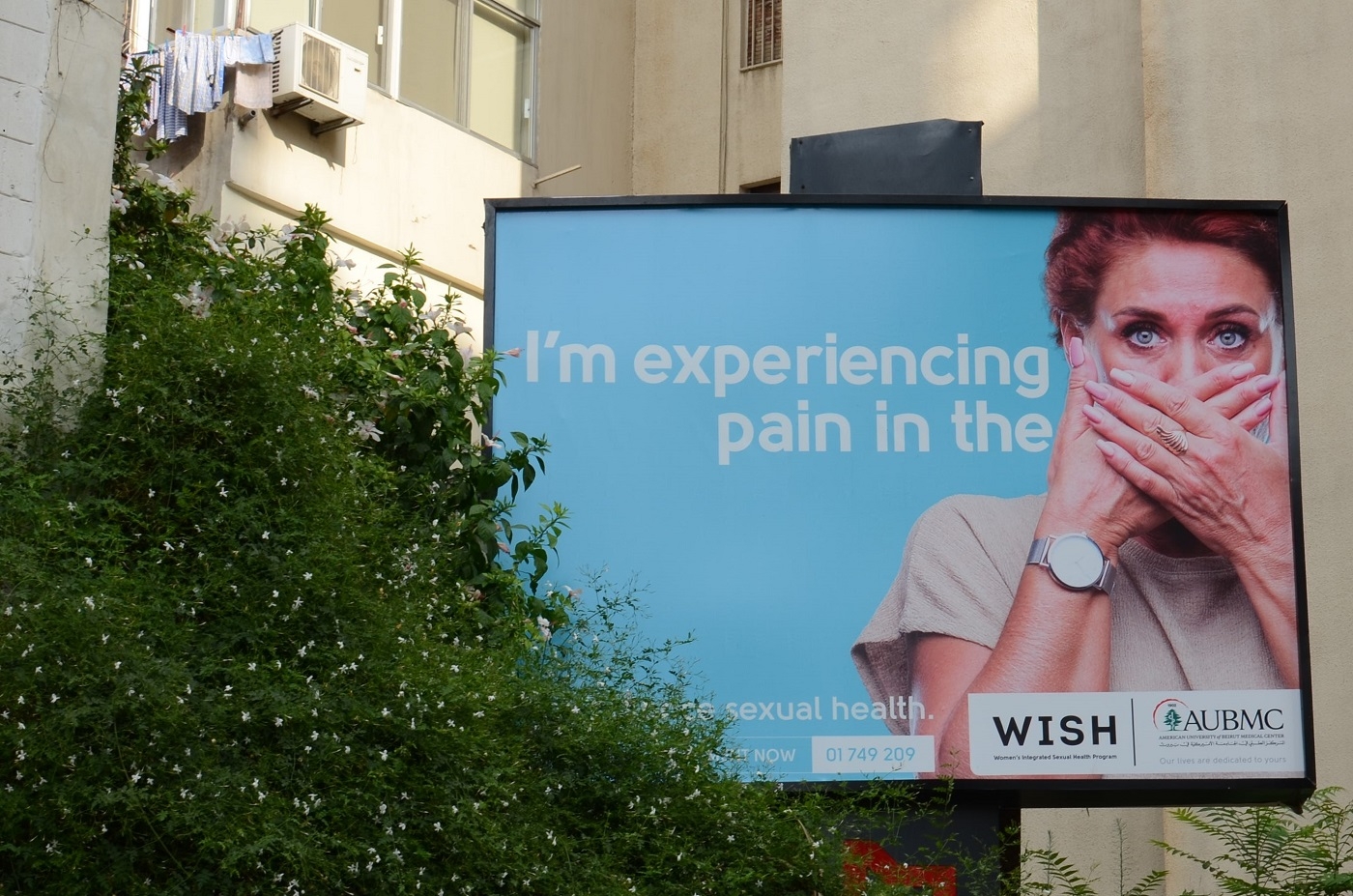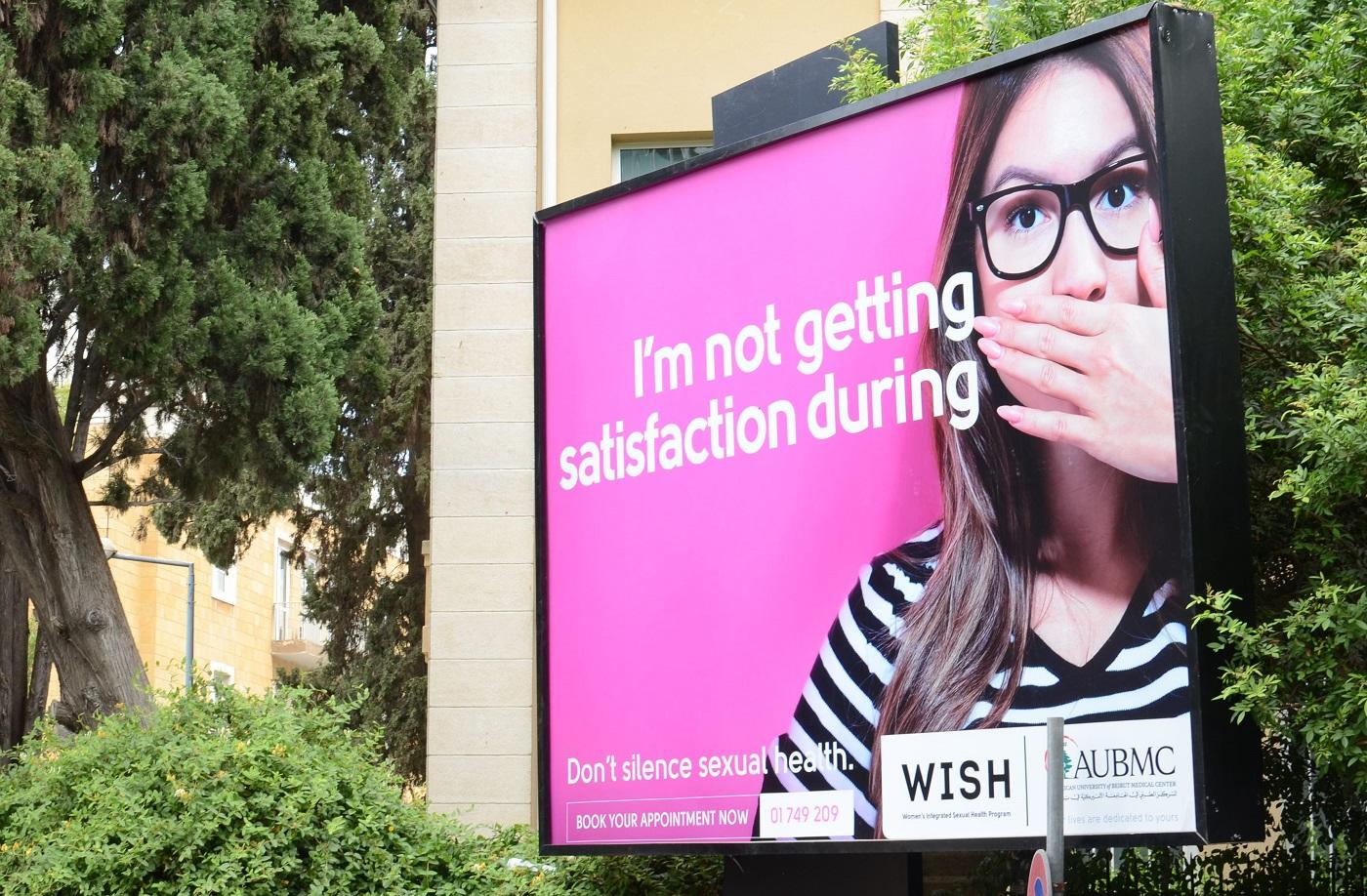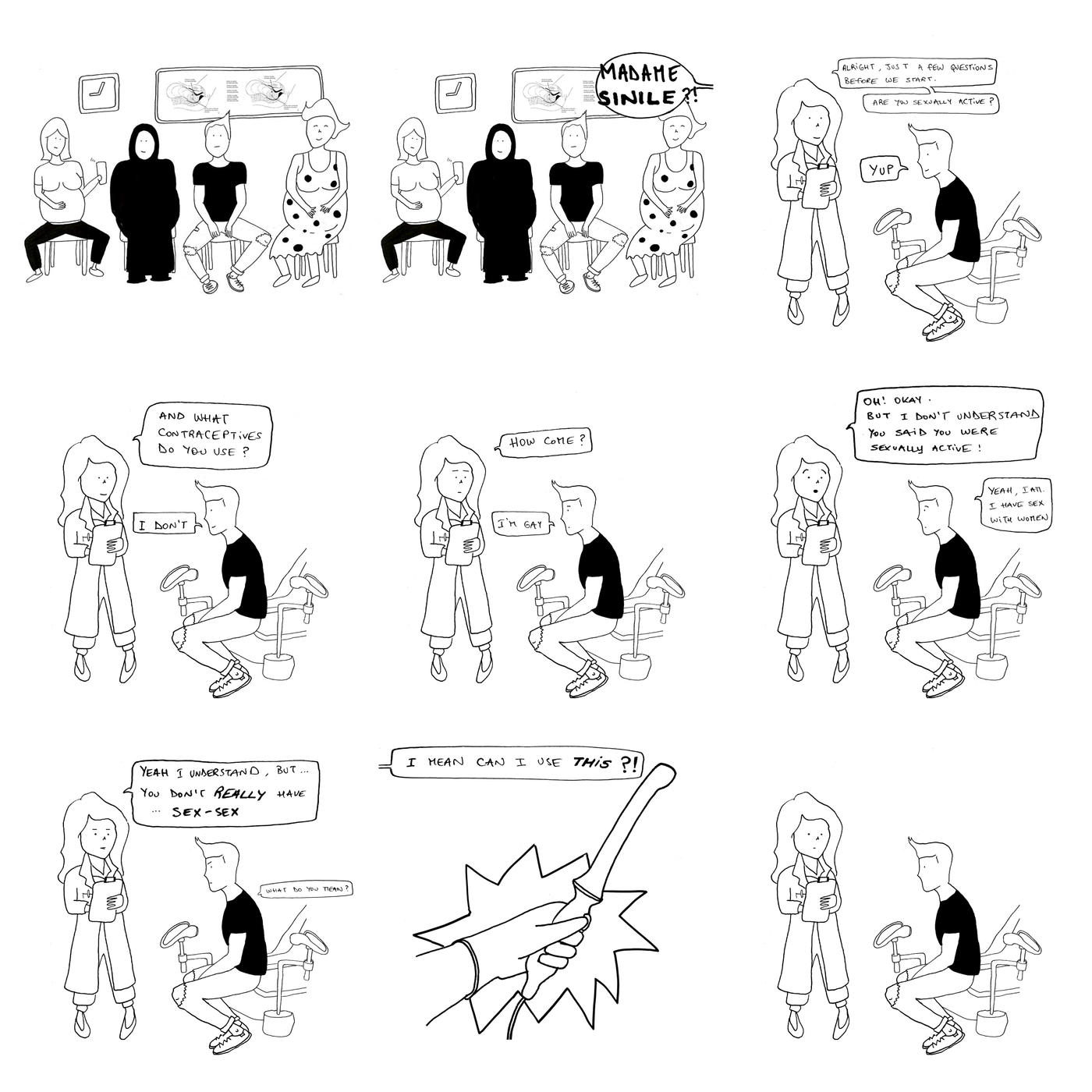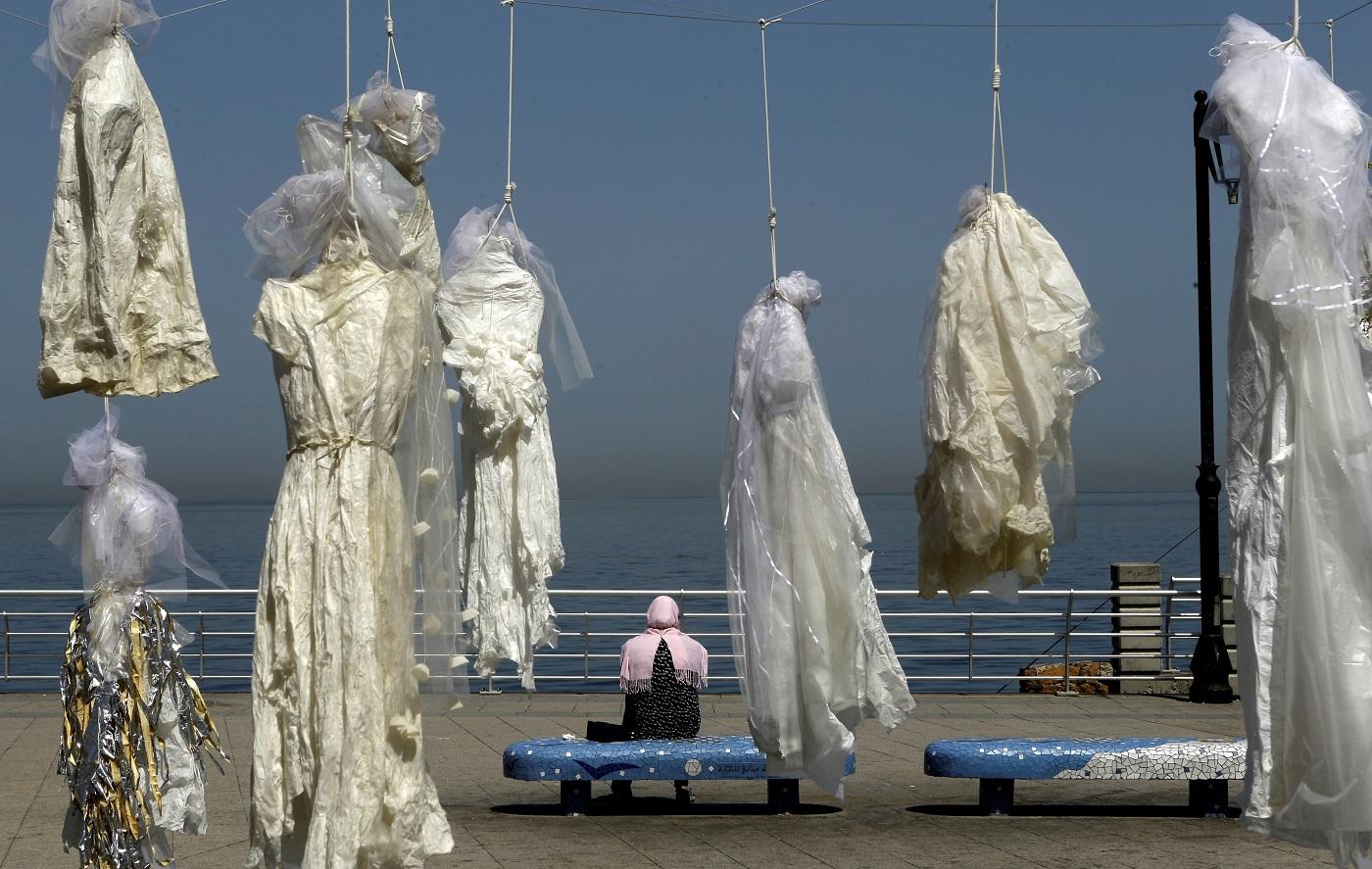Breaking taboos: Can Lebanon be honest about sexual health?

In mid-summer, the billboards above the busy Beirut streets started featuring ads with women standing against colourful backgrounds. Their hands delicately cover their mouths as well as the final words of sentences they're struggling to finish.
"I'm not getting satisfaction during ... "
"I'm not feeling pleasure when I ... "
"I have a weird sensation in my ... "
Then, the tagline: "Don't silence sexual health."
The campaign - eye-catching and imperative - is for the American University of Beirut Medical Center's new Women's Integrated Sexual Health Program, known as WISH.
The programme's director, gynaecologist Dr Faysal El Kak, tells Middle East Eye that WISH is a multi-disciplinary team of doctors geared toward providing comprehensive, confidential sexual healthcare for women and their partners.
"We hope we're breaking silence," he says. "We hope that we're telling people sexual health is essential."
When Sinine Nakhle, 29, first saw the posters, she experienced two competing reactions. One, she says, was: "This is amazing. I think that AUBMC is doing something excellent, right? They are starting to break certain taboos."
But Nakhle, the creator of online comic series Beirut By Dyke, also had reservations. "Wait," she thought. "The issue is not with us - we would LOVE to talk about this, but we don't actually have the space to do that."
Health and confidentiality
Lebanon has a reputation as one of the region's most socially liberal countries. However, strong religious and traditional mores are found across many aspects of Lebanese life - and the bedroom and the medical clinic are no exception.
Sex education is not a mandated part of the school curriculum, after conservative parents and religious disapproval foiled several attempts to introduce it. Even for medical students, sex education is scant, barely going beyond basic reproductive biology, although that may be slowly changing.
Doctors routinely ask their patients if they're 'married' to ascertain whether they're sexually active, implying that this is the only legitimate reason to have sex
Nevertheless, doctors routinely ask their patients if they're "married" to ascertain whether they're sexually active, implying that this is the only legitimate reason to have sex. Abortion is illegal in almost all cases in Lebanon
Moreover, in a tight-knit, small and paternalistic society, patients are likely to worry about confidentiality issues: even getting into a consultation room without the presence of a mother might be difficult. If the patient is allowed in alone, there is always the possibility that the doctor will discuss their sexual history with their parents.
These factors make it difficult for women and sexual minorities to seek medical care. "The value of care is around fertility and pregnancy and giving birth," says El Kak, noting that while 97 percent of pregnant women seek ongoing medical care, only around 20 percent of women get regular check-ups.
Sara Abou Zaki, project manager at Beirut-based sexual health clinic Marsa - which provides inclusive, confidential, discrimination-free STI and HIV testing, medical consultations, and psychosocial counselling – explains that women make up only 20 percent of the clients.
Long before the WISH campaign, Marsa had "Leila the Spy," a video campaign that sought to de-stigmatise menstruation - even such everyday topics are laden with taboo.
When making an instructional video on how to use a condom, Marsa quickly recruited Mashrou' Leila lead singer Hamed Sinno for the male part, but spent a whole year trying to find an actress willing to be associated with contraceptives.
The discourse, says Nayla, a 25-year-old Beiruti who asked that her real name not be used because of the subject matter, is "nowhere close to where it should be. It's still very unhealthy, even within our middle class, upper class, 'educated' - in quotations - circle."
Being sexual with a partner, she says, will often be accompanied by feelings of guilt - a sense, almost, that one's mother is in the room, observing. "We are made to feel shameful. It's always in the back of our heads." This internalised stigma can have very real effects on sexual health.
Psychosexologist Dr Sandrine Atallah notes that sexual pain is one of the main reasons that women seek out her services. "We have cases of impossible penetration because of pain or fear," she says. "It is called usually vaginismus, which are involuntary contractions of the outer muscles of the vagina. It's very frequent here, and we have a lot of cases of unconsummated marriages."
Atallah suggests a causal link between the prevalence of this sexual dysfunction and social stigma around sex. "Vaginismus is more frequent in our country because there are a lot of taboos in our country around the first time and virginity and the hymen."
In some cases, Atallah sees patients who have been traumatised by other physicians' attempts to "cure" their vaginismus. These "horrible stories" include the use of general anaesthesia to render the wife unconscious, at which point the husband is encouraged to penetrate her; and hymenectomy, in which the hymen is removed or opened, followed by vaginal probes.
Resistance at every level
For those at ABAAD, an NGO working at the grim intersection of gender-based violence and sexual health, lack of knowledge about these subjects makes progress challenging.
Alma Chami, who works on ABAAD's clinical management of rape project, says that they face resistance at every level - from police, medical professionals, and beneficiaries. Many of the latter must even be convinced that intimate partner rape is a crime, rather than a normal part of marital relations.
Such basic gaps in knowledge around sexual and reproductive health and rights are the norm. The A Project, an NGO that focuses on sexuality and mental health - specifically for women and gender-nonconforming people - runs a hotline to field questions on sexuality and gender.
By October 2016, 15 months after its inception, most of the calls were about menstruation, sexually transmitted infections, urinary tract infections (UTIs), and unwanted pregnancies. Fifty-three percent of the calls were from cisgender women - women comfortable with their female identity from birth.
Meanwhile, members of the LGBTQ community, like Sinine Nakhle, face additional barriers when attempting to access sexual health care. "This is already an uncomfortable situation to be in as a woman, so you can imagine the layers of added anxiety if you are a sexual minority," Nakhle says.
In Lebanon, legislature against "sexual intercourse contrary to nature" has been used to penalise non-heteronormative behaviour (although several recent cases attempting to prosecute consensual homosexual sex on this basis have been rejected). The 2019 BBC Arabic survey found that just six percent of Lebanese surveyed thought that being gay was acceptable.
A 2010 study found that half of the Lebanese physicians contacted would be unwilling to provide care for homosexual patients.
Souad al-Challah, executive director of the Beirut-based Lebanese Medical Association for Sexual Health (LebMASH), says that although it seldom receives complaints about complete refusal of care, a significant number of psychologists, psychiatrists and family doctors in the country still engage in some form of sexual orientation change efforts (SOCE).
"Medical curricula are not inclusive of LGBT health topics, so medical students graduate not knowing that homosexuality is not a disease, and therefore proceed to perform SOCE as per their personal beliefs and values," al-Challah says. (This, despite a 2013 affirmation by the Lebanese Psychiatric Association that being gay is not a mental disorder).
Workshops for medical professionals have to cover basic concepts, like the difference between gender identity and sexual orientation
Marsa's workshops for medical professionals have to cover basic concepts, like the difference between gender identity and sexual orientation.
Even if a doctor is not involved in outright discrimination, little familiarity with non-heteronormative realities might make them unable to provide a safe space.
"The queer community already has a lot of reasons to be stigmatised; they have reasons to dissociate from their bodies," Nakhle says. "If they're already reluctant but they do [seek care] and experience any traumatic event, you can imagine how difficult it would be to have trust in the medical establishment and seek out another doctor."
Abou Zaki says that the impact of such societal stigma is unambiguous. "Even if we don't have numbers, we know for a fact that it means many people are getting late diagnosis. Some of them have different implications on their health because they didn't receive treatment at a certain time."
Recent crackdowns on LGBTQ activity have included the abrupt cancellation of a 9 August Mashrou' Leila concert after church pressure (Sinno is openly gay); the detention of the 2018 Beirut Pride organiser; and efforts by Lebanese authorities to shut down the Arab Foundation for Freedoms and Equality's NEDWA 2018 conference and ban foreign attendees from returning to Lebanon.
As a result, the community, and the organisations serving it, is under pressure. "We're very careful when we talk about our services," says Abou Zaki.
The A Project and LebMASH actively gather names of medical providers who are LGBTQ-friendly, open-minded, and non-discriminatory. Although no reference to the community is made in its promotional materials, El Kak says that WISH is "inclusive" and welcomes "everybody".
Beyond Beirut
However, services are concentrated in the capital: access is much harder for poorer, rural, or marginalised groups. Sexual health care is not covered by public or private health insurance, making it effectively out of reach for all but a privileged few (an initial appointment at WISH will set patients back around $100).
And in a country where personal status laws are sectarian in nature, making religious authorities the last word on issues including divorce, marriage and custody of children, this can mean that the rights of women and sexual minorities are systematically undermined.
'Whether I'm doing my groceries or just walking in the street, people approach me and tell me: "We need this, we need sexual education''
- Sandrine Atallah, psychosexologist
Nevertheless, in Beirut there is consensus that moves are being made in the right direction. Alma Chami and her colleague at ABAAD, Rassil Barada, agree that the repeal of Article 522 (the "marry your rapist" law) and a recent memorandum of understanding signed with the education ministry to include sex ed in the school curriculum constitute "a beam of light for us".
And incremental change is visible in the field. "If just one woman is helped, if she gains agency, if she feels differently about herself in the world, then that is success," says Barada.
WISH's El Kak expresses confidence that people are "thinking more about these issues and being more bold talking about it," and that WISH's efforts to promote sexual health will further destigmatise it.
"We used to talk about reproductive health and now we talk about sexual health or sexual rights, post-abortion care, contraceptive choices. We're in the middle of a battle, but we're now giving it a form, a service, a function within a very prestigious, trusted place in the region."
Atallah, who is part of the WISH programme and a recognisable public figure in the field of sexual health, has noted a considerable uptick in positive feedback to her outspoken media presence.
"Whether I'm doing my groceries or just walking in the street, people approach me and tell me: 'We need this, we need sexual education'."
This article is available in French on Middle East Eye French edition.
Middle East Eye propose une couverture et une analyse indépendantes et incomparables du Moyen-Orient, de l’Afrique du Nord et d’autres régions du monde. Pour en savoir plus sur la reprise de ce contenu et les frais qui s’appliquent, veuillez remplir ce formulaire [en anglais]. Pour en savoir plus sur MEE, cliquez ici [en anglais].









